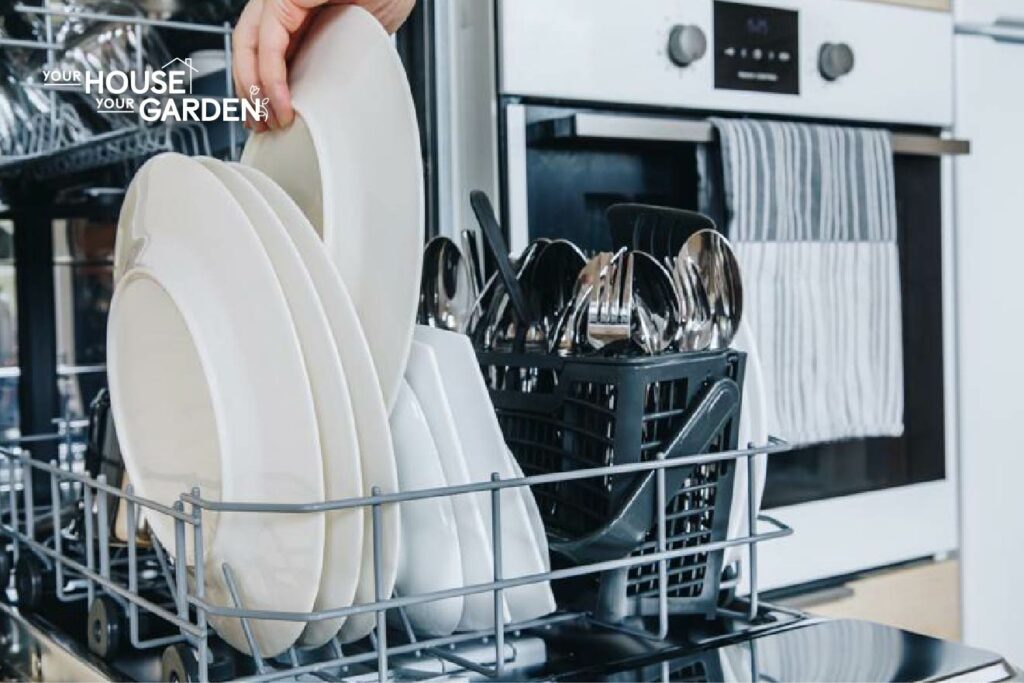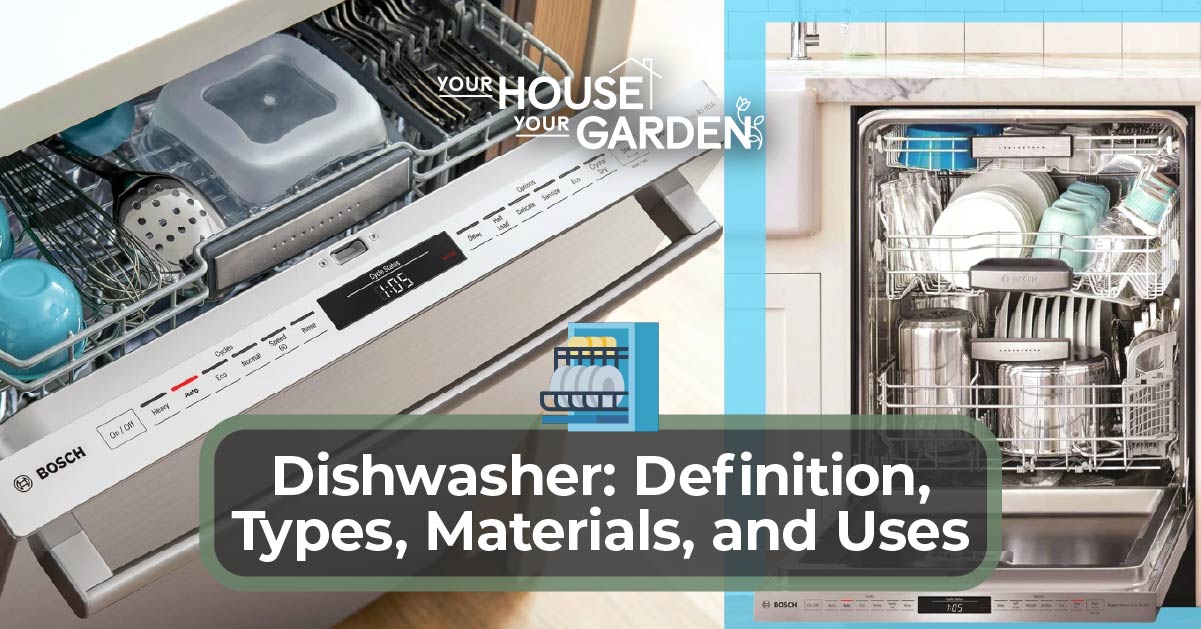A dishwasher is an appliance that automatically washes dishes. A dishwasher connects to the home’s water and electrical systems to use high-speed and high-pressure settings to wash dishes.
The best type of dishwasher is a stainless steel dishwasher. Stainless steel dishwashers are modern and less likely to scratch or dent. Stainless steel dishwashers may cost more than plastic or aluminum dishwashers, but they also last longer. Many dishwashers today are available in an energy-efficient design, which means they use less energy.
Dishwashers come in a square shape and go underneath the countertop. Choosing the best dishwasher requires choosing one that fits your kitchen dimensions.
The history of the dishwasher dates back to 1850 when Joel Hougton received a patent for the first dishwasher. Since then, Josephine Cochran was the first to use pressure to wash dishes.
Materials for Dishwasher
The best material for a dishwasher is stainless steel. Stainless steel dishwashers are more expensive than plastic or aluminum dishwashers but last longer. Stainless steel dishwashers are also more resistant to rust.
The cheapest type of dishwasher is made with plastic materials. Plastic dishwashers can wear down over time and may require more repairs. It’s also important to consider the rack material. Most dishwashers come with plastic racks but stainless steel may also be available. Stainless steel racks last longer and are less likely to break or peel.
There have been some concerns over how well dishwashers clean and sanitize dishes. A stainless steel dishwasher does a better job at removing debris. Dishwashers with higher heat settings and high-pressure agitators do better at removing food debris and cleaning and sanitizing dishes.
Types of Dishwasher
The types of dishwashers include:
- Built-in dishwasher: A built-in dishwasher is one that is built into your countertop. A built-in dishwasher has a separate water hookup.
- Drawer dishwasher: A drawer dishwasher slides out similar to a drawer. Drawer dishwashers are usually found in larger kitchens with more space.
- Top control dishwasher: A top control dishwasher can have a third rack or be integrated into the countertop. The controls of a top control dishwasher are on the top.
- Portable dishwasher: A portable dishwasher is a compact appliance that connects to your sink. Portable dishwashers can be stored away in between uses.
Sizes of Dishwasher
The best type of dishwasher depends on your household needs and the space you have for a dishwasher. Smaller dishwashers hold fewer dishes and are better suited for smaller families. If you have four or more people in your household, or you use a lot of dishes when you cook, you may want a larger dishwasher that’s over 30 inches wide.
Smaller households may find a compact dishwasher that’s 18-inches to be suitable. Households with 3-4 people may choose a standard 24-inch wide dishwasher. You also want to choose a dishwasher that fits your kitchen space.
The type of dishwasher can also affect the size. Built-in dishwashers are usually 24-inches wide. Portable dishwashers come in different sizes but are usually compact and easy to store. Drawer dishwashers are larger and are the size of a kitchen drawer.
Does Size Affect Dishwasher’s Usage?
The size of a dishwasher affects how many dishes you can clean. If you overfill a dishwasher, it won’t wash the dishes as well. If you don’t have enough dishes to fill your dishwasher, you may waste energy and water using it. It’s best to choose a dishwasher size that accommodates your household needs.
Use Cases of Dishwasher
A use case of a dishwasher is the way in which you use your dishwasher in the home. A few use cases of dishwashers include:
- Sanitize toothbrushes
- Clean BBQ parts
- Wash flower pots
- Clean garden tools
- Wash sponges
- Clean children’s toys
- Clean dog’s toys
- Degrease automotive parts
- Wash tools
- Clean dustpan
- Wash and sanitize dishes
Once you learn how to use a dishwasher, you’ll find that it can be used to wash more items than your dishes.
Do Dishwashers Have Health Benefits?
Dishwashers have proven to be more effective in cleaning and sanitizing dishes. Although hand washing may reduce water use, human error can miss harmful contaminants. Dishwashers also use hot water that cleans the whole unit. When you wash dishes in a sink, it’s likely that the sink has bacteria in it.

Most Known Dishwasher Brands
Some of the best dishwasher brands right now include:
- Best value dishwasher: LG
- Best splurge dishwasher: Bosch
- Best portable dishwasher: GE
- Best smart dishwasher: Whirlpool
Dishwasher Lifespan
The typical lifespan of a dishwasher is 10 years. The initial quality and frequency of use can affect how long your dishwasher lasts. The following factors contribute to how long you can expect your dishwasher to last:
- Material selection: The material that you choose affects how long your dishwasher can last. Stainless steel dishwashers last longer than plastic dishwashers.
- Frequency of use: How often you use your dishwasher affects how long it lasts. If you use your dishwasher multiple times per day, you can expect it to wear out faster.
- Upkeep and maintenance: Routine maintenance and upkeep are important in extending the longevity of your dishwasher. This includes prompt repairs when needed.
- Brand selection: Some brands of dishwashers last longer than other brands. Choosing brands like LG and Bosch may last longer than others.
The average cost of a dishwasher ranges between $400-$3,000. Stainless steel dishwashers that are larger with more built-in features cost more than smaller, plastic dishwashers.
How Does Culture Affect the Usage of a Dishwasher?
Dishwashers are most commonly used in the U.S. which isn’t surprising since they were first invented there. Some countries around the world still rely on handwashing, including Australia and Poland. Many countries in Europe also still hand wash dishes to cut down on water and electricity usage.
Relevant Kitchen Tools to Dishwasher
Some tools are relevant to a dishwasher, including:
- Cookware: Cookware is a kitchen tool necessary for cooking meals. Non-stick cookware can also make it easier to wash dishes, even in the dishwasher.
- Utensils: Utensils are a relevant tool for consuming meals. Stainless steel utensils mean you can wash them in the dishwasher.
- Wine cooler: Both a wine cooler and a dishwasher can be used for storing items. A wine cooler is a permanent storage compartment, whereas most people don’t use a dishwasher for long-term storage.
- Mini-fridge: Both a mini-fridge and a dishwasher can be used to store items. A mini-fridge is also a permanent storage compartment, whereas a dishwasher is only used for temporary storage.
Difference Between a Dishwasher and a Dishdrawer
The primary difference between a dishwasher vs a dish drawer is the size and shape of each appliance. The standard size of a dishwasher is 24-inches wide and 24-inches deep, giving it a square shape. A dish drawer is usually between 24 and 36-inches wide, but only 19-inches tall.
Another difference between a dishwasher and a dish drawer is the amount of water that each appliance uses. A dish drawer washes fewer dishes and is much smaller, meaning that it uses less water. A dishwasher uses more water, but many are designed as energy-efficient.
Features of a Good Dishwasher
Here are a few features to consider when choosing the best dishwashers:
- Design: Dishwashers come in all different designs and styles today. Choose one that fits your kitchen.
- Adjustable racks: Dishwashers with adjustable racks allow you to fit larger items that may be otherwise difficult to clean.
- Rinse cycle: A dishwasher with a rinse cycle allows you to rinse dirty dishes without yet washing them until you have a full load.
- Soil sensor: A dishwasher with a soil sensor can improve efficiency by identifying how much water is needed.
- Wash zones: Dishwashers with different wash zones allow you to place heavily soiled items in parts with more water pressure.
- Customizable cycles: Some dishwashers have customizable wash cycles, which allow you to choose the type of washing you need.
- Silverware rack: A silverware rack holds your utensils and prevents them from moving around in the dishwasher.
- Heat dry: A heat dry setting on a dishwasher prevents your dishes from coming out still wet after the cycle.
- Easy touch controls: Dishwashers with easy touch controls are more comfortable to use.
- Noise level: Dishwashers come in different decibel levels between 46-60 dB. Depending on the location of your dishwasher, you may want a quiet one.
- Energy-efficiency: Energy efficiency refers to the level of energy used. Dishwashers that are energy-efficient are cheaper to use.
Components of a Dishwasher
A dishwasher is made up of the following parts:
- Heating element: The heating element heats the water and air in the dishwasher during the wash and dry cycles.
- Detergent dispenser: The detergent dispenser is a small compartment that holds the detergent until it’s ready to disperse.
- Controls: The controls of a dishwasher are either on the front or top of the dishwasher and allow you to set cycles.
- Racks: The dishwasher racks hold your dishes and utensils during the wash and dry cycles.
Repair Options for a Dishwasher?
If your dishwasher stops working, you may be able to repair or replace certain parts rather than replacing the full unit. A few repair parts for dishwashers include:
- Spraying arms: The spraying arms can get rusted or broken over time. You may be able to replace one, or both, of the spraying arms.
- Door handle: The door handle, or latch, is what opens and closes the door of the dishwasher. The door handle can get loose over time and may need to be replaced.
- Controls: The controls can become faded or stop working. You may need a control pad repair.
- Racks: If the racks become broken or rusted over time, you may be able to replace them easily.

Difference Between a Dishwasher and Hand Washing
The primary difference between a dishwasher and hand washing is the effort of each method of cleaning. A dishwasher automatically cleans dishes for you. When handwashing, you have to pre-soak, scrub, rinse, and dry your dishes.
Another difference between a dishwasher and hand washing is the amount of water used with each cleaning type. While some people may hand wash to save water, most of today’s dishwashers use less water than hand washing.
Dishwasher Name Origin
The name of the dishwasher comes from its ability to wash dishes. Dishwashers are automatic machines that wash dishes using a spin agitator and high-pressure water.
Spell dishwasher as: D-i-s-h-w-a-s-h-e-r.
To pronounce dishwasher, say: (Dish-waa-shr).
Dishwasher History
The first dishwasher in history dates back to Joel Houghton in 1850 when he filed a patent for a product that washed dishes. The first automatic dishwasher is credited to Josephine Cochran. Her antique dishwasher used water pressure rather than scrubbers to clean the dishes. This version of the dishwasher was much more efficient.
This earned Cochran a place in the U.S. National Inventors Hall of Fame in 2006. The inspiration came from Cochran’s frustrations of having to wash dishes after hosting frequent dinner parties. Even though Cochran had staff to do the dishwashing, they frequently chipped her good china dishes. She wanted to invent a product that sped up the time it took to wash dishes, while also protecting delicate dishes. She went on to turn her automated dishwasher into a business. Her dishwashers were soon found in restaurants, hotels, and in the homes of socialites all over the country.

